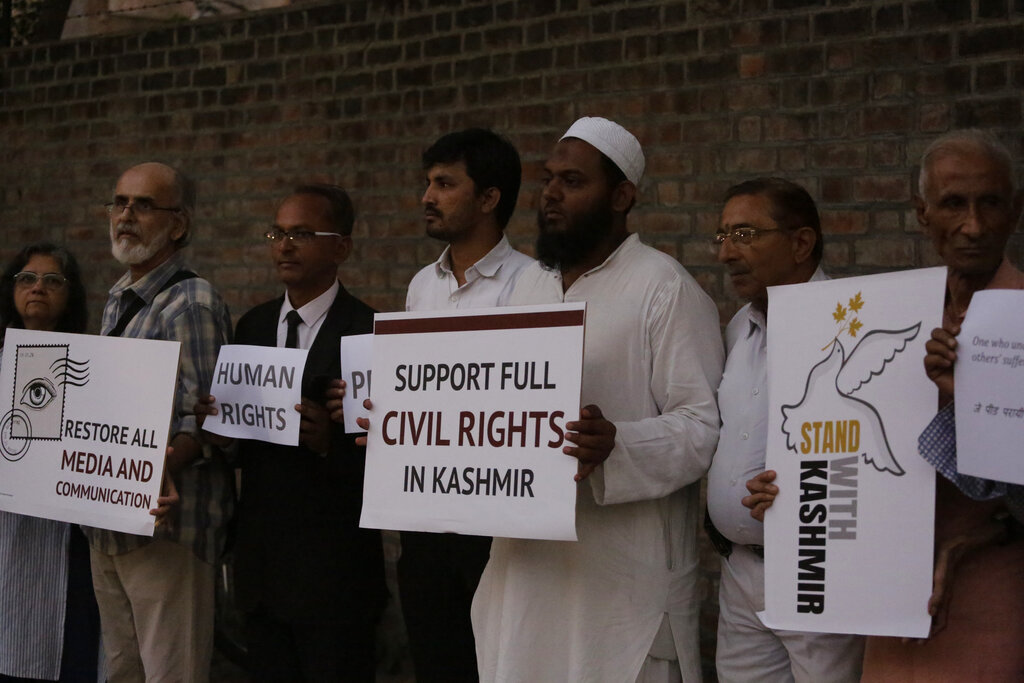On the morning of August 5, before Kashmir was stripped of its special status, a factory owner on his way to work was stopped by the Indian Army inside Lassipora Industrial Estate, handed a hammer and ordered to get cracking.
A small army camp of 44 Rashtriya Rifles, housed in an abandoned unit of Hindustan Petroleum inside the state’s largest industrial estate, had to be upgraded. Sheds had to be built, the ground levelled and grass planted — so labourers were needed.
“I was stopped by the army and dragged to the camp for begaar (forced labour). They did it with everybody who was moving that way. Inside the camp, I found 20 to 30 civilians already working there and they were also brought there like me,” said the factory owner, whose identity The Telegraph is not revealing for his safety.
“I pleaded that I should be spared because I was a factory owner but they retorted that I have to put in twice as much work as others do. They handed me a hammer and made me work for hours,” he said.
Last week, over two months after the incident, his hands bore marks of injury induced by the forced labour.
The Telegraph spoke to factory owners, employees and residents of adjoining Turkwangan village who alleged that many had to do “begaar” at the army camp. Anyone in the vicinity was stopped, dragged to the unit and made to work for hours, they said. This went on for weeks. This paper spoke to one unit holder, some employees and locals who said they were forced to work at the camp.
The defence spokesperson in Srinagar, Colonel Rajesh Kalia, said these allegations were baseless. “Nobody was harassed or forced to work there,” he said.
The army has since erected drop gates at two ends of the camp facing the road and vehicles moving in or out of the estate towards Turkwangan village are now stopped for checking.
Scrapping the key provisions of Article 370 that gave Kashmir its special status, the Narendra Modi government had said this law had been a barrier in the path of the state’s development and its removal would usher in a new era of progress.
On August 5, the entrepreneur was among hundreds of civilians, including employees of units in the industrial estate, who experienced what this development might mean.
“It is they (the army men) who told me on August 5 morning that Article 370 was being scrapped. The announcement came hours later in Parliament,” the factory owner said.
Another entrepreneur, who owns a unit in the estate, said that from hours before Union home minister Amit Shah made the announcement on Article 370 in Parliament and until weeks afterwards they tasted “the first fruits of the development mantra”.
Begaar was a bane of the early years of the militancy in the Valley.
Some people were paid for the labour while many others were not but nobody joined the work voluntarily, the people this paper spoke to said.
“We were directed to construct a few sheds, which we did and were paid for that but the question is whether we were willing to work there or not? We were obviously not,” said one.
“Because of the shutdown and the fear (of the army), we would dread moving into the estate for weeks. Some activity you see around is only a recent phenomenon.”
Some people said they were given rice and oil as wages.
An employee was allegedly badly thrashed, after which the unit holders said they took up the issue with the army officers and things eased.
The estate hosts 350 units, which are shut for weeks as part of a shutdown against the scrapping of the state’s special status. About a dozen-and-a-half cold storages for apples resumed operations more than a week back, allegedly with a go-ahead from militants.
A senior functionary of the unit holders’ association said they suffered huge losses during the past 11 weeks. “Our losses are mounting. NPAs are growing as we are not able to service the debt. My personal losses run into crores,” he said.
The factory owner who was stopped on the morning of August 5 no longer takes the road by the army camp to his place of work, preferring a longer detour.











